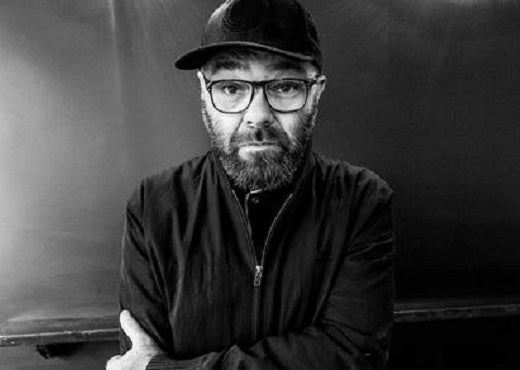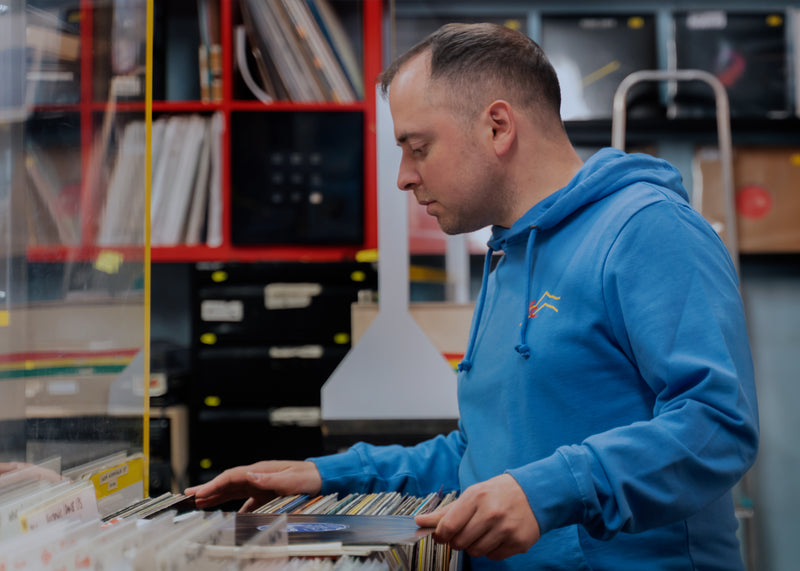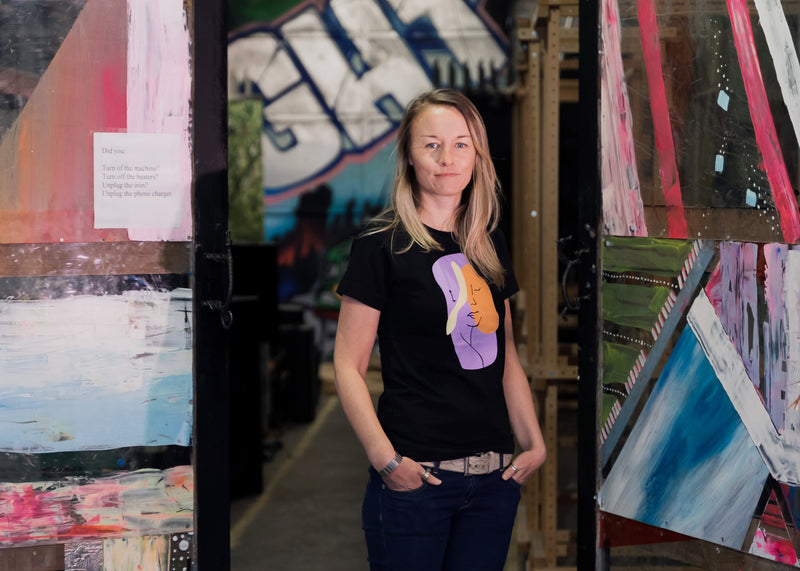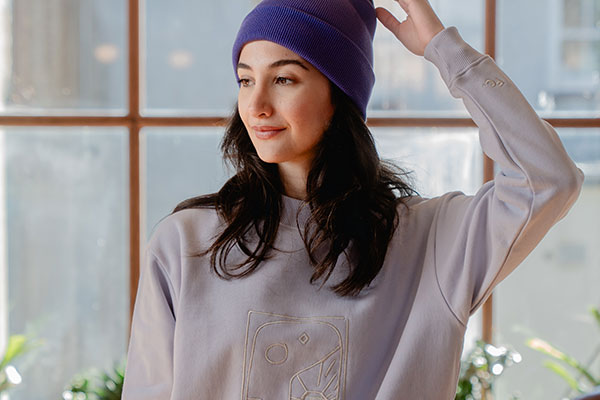
Aoife wearing shooting stars jumper by Fresh Cuts
DJ Aoife Nic Canna has been a central figure in the Irish dance music scene for over 25 years. She was nicknamed the ‘First lady of Irish House’ by Hotpress magazine, and has played some of the best known nights in the city, clocking up residencies in the Kitchen, the Rock Garden, 4 Dame Lane and an 8 year slot in RiRa.
As a radio broadcaster, she’s produced and presented a huge range of arts, music and Irish language shows. For 5 years she championed home-grown electronic music with her show ‘Club Cheol’, and is responsible for the epic ‘Folklore from the dance floor’ a 6 part journey into the history of Irish Clubbing.
You can usually find her in Ukiyo Bar, the Liquor Rooms, Berlin D2, and in more recent times, streaming live from her sitting room on social media.
After months of staying inside and limiting our contacts, Aoife was sound enough to invite us over for tea and chats. It's been a while since any of us have got to hang out with someone new, and we’ve plenty to talk about.
Schools have started back and restaurants and pubs are open for food, but Aoife’s industry is still deep in lockdown. Even as places open up, It doesn’t look like there’ll be a return to DJ’s or live music anytime soon.

Aoife at work
‘‘That broke my heart of course” she tells us. “One thing about Dublin before Covid, is they really appreciated what DJs brought to a venue, and I think they do miss us. I think the fact that we're not allowed DJs will make people want us more!’
We’re having a hard time wrapping our heads around what's happened. 6 months into it, it still feels surreal. “Did you ever think they were going to close our pubs?!” she muses. “..that they’d be closed for 5 or 6 months and there weren't riots on the streets?!”
The idea of the Irish shutting the pubs would have been unimaginable a year ago, they’re so central to how we live. “The fact that we’ve gone through a whole summer without our social life and our escapism.. it's hard to believe that we've actually done it!“
Like most of us, she never expected it to go on for so long. She’s grateful for the safety of lockdown, and understands why things needed to close, but thinks we have to learn to start living with the virus now.
She’d like us to get back into town. “I find it very upsetting that my favorite places are struggling,” she tells us. “I’m not sure people really understand how expensive it is for them to reopen, how much money they’ve actually lost.”
“We're all careful now, we’ve been trained in how to socially distance and keep our hands clean” she says. ‘‘Venue owners are going to take it very seriously because they are so desperate to get their business open.”
Before all this, she was loving Dublin. “I was having a great time, really enjoying myself.” she remembers. ”There was just so much we could do... With live music, people were bringing really good bands and musicians over. We have so much more variety now than we did when I was a kid!”
Aoife’s been a music fanatic her whole life, and first started going out in 1980’s Ireland, a very different place, socially, culturally and economically. She’s seen a few changes since then.
“In the early 90’s when I started DJing we were like the underdog, no one really wanted us in venues….with the few that would take us, we’d have to do them up because they wouldn’t really be suitable for dance music culture. We didn’t have good sound systems or anything like that.”
In the Celtic Tiger days, we suddenly had access to all these new things - ‘exotic wines’, ‘cocktail culture’ and fancy venues, but that didn’t bring much culturally. “It was just really repulsive - everything was clean and flash and shiny.”
“We had these beautiful venues that they’d spend thousands and thousands of Euros doing up, and then they’d close 3 months later and someone else would come along and gut it, and do it again!”
“If you look at Dublin pre-covid, we were kind of spoiled - we had really good venues, Funktion-One sound systems and way more choice than before…now, if you want to go to a drum and bass night, or a techno night, or a house night you can.”
“It felt like playing in Dublin, the young people were much more interested in underground music...Our licensing laws are a joke but we still have plenty of talent and interest in music in Dublin.”
In the past it seemed like musicians and artists had to leave Ireland to become successful, and we’re curious to know how Ireland is for nurturing our talent now.
“There’s still a little bit of that” she believes. “In some of the big festivals we have a lot of international acts and bands, where I would like to see more of our own bands and DJ’s getting exposure”. There are a few that work to promote local talent, particularly smaller festivals and events. “I would like more of that,” she tells us, “..we need it too”.

Aoife Nic Canna
A group worth mentioning is the Gash Collective, whose goal is to support female identifying and LGBTQ+ producers and DJs in electronic music. Aoife was involved in a series of production and DJ workshops that they ran for women. “It's about exposing women to electronica,” she explains, “and creating a space for them not to be intimidated by making music or DJing.”
This is important to bring a bit of diversity into the industry. For most of Aoife's career, people would double take at seeing a woman behind the decks.
“People are always asking me about being a female DJ, how there’s so little of us and how isolating that can be” she tells us, “but in the early 90s I was totally on my own there - of course there were a few women DJs around, but now it has evolved so much. It's great to see that women are encouraged.”
“I do think this changed after Gash launched... Times are changing and moving forward. There's plenty of good women DJs and producers out there now and they're doing it - they're not talking about it, they're doing it!”
There are way more platforms for Irish artists these days, particularly with online radio.
“Going back to pirate radio days in the early 90’s, I did a very long stint on Jazz FM, and on Power FM.. I never had as many listeners as I did then because there was only one dance music radio station, so people did tune In. We didn't have the internet, so they relied on us as DJs to be playing the most up-to-date dance music”
We have much more choice now, but the flipside is that it can be tough to get listeners. There’s always new stations starting up, but she’d rather we nurture the ones we have, and remember to listen to them more.
She recommends Radio na Life (she’s a gaeilgeoir) and DDR (Dublin Digital Radio) for dance music. She’s a big fan of community radio, particularly Near FM where she trained and produced most of her work.
It was through them she made ‘the dynamo effect’, a 24 part series on sustainability, back in 2010 before it was a national conversation; “They did talk about flooding and pandemics” she tells us, “but they weren’t thinking it would happen so soon - it was going to be in the next 20 or 30 years. I don't think the politicians are taking it seriously, and it's a very serious thing.”
“I’ve always been an eco warrior at heart. I hate waste...I think as people we have too much stuff.” Being a collector makes her very conscious of how much she has, and that she doesn’t need anything else. She does have an enviable wall of records, but they’re very much loved and put to good use, not just for her but for everyone she plays them to.
Her policy is to buy well and hold onto things, then pass them on or recycle them. “I love buying clothes, I love collecting trainers, but it's about buying that good decent hoody that will last for ages.” She hopes this experience might help us look at how we use resources, and be kinder to the environment.
We talk about what else might come out of this pandemic. With venues closed, some people have been suggesting virtual concerts as an alternative, and she’s horrified. She has started streaming live sets over Instagram and Facebook, and surprisingly she likes it, but the idea that this could be the new normal for live music is too much.
“I can do a virtual gig, and there’s a space for that, but it's not the future. It's not the same...nothing beats a live gig. It's like going to a club at home...you're just going to look at it and there’ll be someone performing!”
“We finally have good sound systems in Ireland!” she laughs, “...we've been waiting for decades....and everyone’s listening to music on their phones!!”
When we do eventually get back out dancing, she has some treats in store. After a few months of playing indoors, rediscovering old records, and not being so focused on making people dance, she says her music has changed.
“It's more mellow and it's probably more underground as well. I can't wait to get back out and start playing because I'm definitely a different DJ - and definitely a better DJ because I've been practicing that much.”
Which is something to look forward to.
If somebody is visiting Dublin for 24-hours where do you bring them?
The Phoenix Park. I’d bring them to The Visitors Centre for nice food, there’s Ashtown Castle, Farmleigh and amazing walks around there...There’s loads of history in the park, so I know I could keep someone's head spinning!’
I’d definitely have to bring them into my dirty old town. We have amazing restaurants. I love Charlotte Quay - I like going out on the Docklands, because it's like a new Dublin to me. When I was a kid that was barren, there was nothing there at all, so when I go out there I feel like I'm on my holidays!
I would obviously bring them to Ukiyo, Anseo, Berlin bar...and the Sugar Club - any gig in the Sugar Club I'm happy to go to, I just think they're really good bookers and we're blessed to have a venue like that. Bands play really well there, it brings out their best. That’s somewhere I’d be really proud to bring someone. I really hope it's ok and opens soon.





